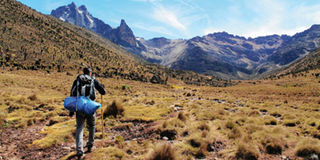Atop Mt Kenya: A peak experience

PHOTO | OSCAR JUMA Going up Teleki Valley.
What you need to know:
- I was grateful we climbed at night, making us oblivious of the sheer slopes surrounding us
I can only vaguely remember the first time I climbed up Mount Kenya. This is largely a consequence of my notoriously bad memory – which isn’t helped by the fact that the trip took place eight-or-so years ago.
What I do recall, though, was spending a windy night next to my chemistry teacher at Shipton’s Camp, who spoon-fed me cough syrup to alleviate both my altitude sickness, and the annoyed groans of my classmates who longed for a good night’s sleep before our summit attempt the following morning.
Since then I have heard glowing reviews from friends who recently attempted the climb, and it made me long for a similar experience. So, accompanied by my friend Oscar, we headed north for Naro Moru – the starting point of our climb up Mount Kenya.
There are three main routes up the mountain: the Sirimon route, which approaches the peaks from the north-west through the Mackinder Valley; the Chogoria route, which snakes through the eastern moorlands of the park and is considered the most picturesque; and finally, the Naro Moru route, which is by far the quickest and therefore most popular path for those on a tight schedule.
We had just four days, so opted for the latter. After a hefty lunch at the Naro Moru River Lodge, we headed into town to pick up our guide Reuben and porter Anthony. While waiting at a petrol station – our rendezvous point – one of the station attendants asked if we wanted some air, indicating towards the front left tyre of our old Range Rover. No thanks, I thought, but if you can bottle it for me to take up the mountain, then we’re in business. But he had no such facilities.
After hiring some walking boots and a suitable backpack, we made our way to the park gate. From there it was a three-hour walk up to the Met Station, the base camp engulfed by the thick bamboo forest that covers the lower ridges of the mountain. Numerous cabins dot the campsite, and there is ample space to pitch either your own tent or have one set up for you before you arrive. The camp is patrolled by a group of resident Sykes monkeys who help themselves to your valuable rations of food – as they did with our loaf of bread and a bag of tomatoes.
Early the next day we embarked on the 10km journey to Mackinder’s Camp, which lies at the foot of Mount Kenya’s jagged peaks. Although the Naro Moru route is not considered the most picturesque, the change of landscape with altitude is breath-taking. The fertile farmland that encircles the mountain’s lower base lies below a thick bamboo belt and timberline forest.
Once through the lush forest, we emerged into a clearing of striking silver and green – the silver was the remnants of an extensive rosewood belt, which had been burnt down by a careless climber’s campfire.
The hillside then transforms into heathland, characterised by what is known as the “vertical bog”. When dry, this section is easily traversed, but when it rains it can be treacherous. As we gradually made our way towards the peak, which now pierced menacingly through the thick fog that enveloped it, the vegetation quickly turned unearthly. The giant groundsels and lobelias make you feel as though you’ve suddenly been transported to a distant planet. These plants line the impressive Teleki Valley, which leads to Mackinder’s at the foot of the peaks.
At 3 am the following morning, we flanked the Lewis glacier and inched our way up the vertical scree slope to Point Lenana, the third highest and most accessible peak.
If you go...
Fees for a 4-day climbing package:
Citizen: Sh2,000
Resident: Sh3,500
Non-Resident: Sh19,000
Guide Fees: Sh1,700
Porter Fees: Between Sh500 and Sh1,700
Accommodation on the Naro Moru route per person per night:
Met Station: Sh1,200
Mackinder’s: Sh1,000
For more information contact:
The Mountain Club of Kenya – www.mck.or.ke; or
Naro Moru River Lodge Nairobi Office: 0708 984 003; 0708 984 005; 020 444 8507
Jan Fox is a consultant at iDC.




